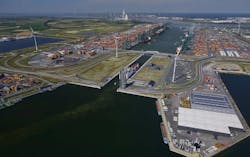Accenture, EPRI join global partnership on moving Industrial Clusters to Net Zero
A total of four industrial groups in the U.S., the Netherlands and Belgium have joined the “Transitioning Industrial Clusters towards Net Zero” initiative, which aims to decarbonize hard-to-abate industrial sectors.
The World Economic Forum is collaborating with IT services and consulting firm Accenture and the Electric Power Research Institute (EPRI) on the “Transitioning Industrial Clusters towards Net Zero” initiative. It connects private and public stakeholders to evaluate their decarbonization goals and foster enabling policies.
The four clusters joining the initiative are the Brightlands Circular Space in Geleen, Netherlands, the H2Houston Hub and the Ohio Clean Hydrogen Hub Alliance in the U.S. and the Port of Antwerp-Bruges in Belgium. The Ohio Clean Hydrogen Hub Alliance has about 100 corporate, governmental and community organization members. The H2Houston Hub has over 100 organizations and companies.
Industrial clusters are regions where the companies are concentrated, facilitating sharing of infrastructure, financial and operational risks and natural and human resources. It also enables the deployment and scaling of new green technologies, like hydrogen and carbon capture and storage.
“Sharing infrastructure, maximizing synergies and expanding use of circularity principles across industries will be critical in reducing emissions, while maintaining industrial competitiveness and creating opportunities for employment in these industrial heartlands,” said Melissa Stark, a managing director and Global Lead for Renewables and Energy Transition Services at Accenture. “We are keen to help rapidly expand this program and urge industrial clusters in those regions committed to net zero to join us. Accenture brings its global footprint and experience in digital, sustainability and the energy transition to this project, working closely with the World Economic Forum and EPRI to deploy a cross-technology approach anchored on innovation, partnership, policy, and financing strategies.”
Clusters, already participating in the initiative, include Zero Carbon Humber and Hynet North West in the U.K., the Kwinana Industries Council in Australia and the Basque Net-Zero Industrial Supercluster in Spain.
The eight clusters may save a combined 334 million tons of CO2 and contribute $182 billion to the regional GDP.
"The Ohio Clean Hydrogen Hub Alliance seeks to locate a clean hydrogen hub in the state of Ohio and the Ohio River Valley, leading to the eventual decarbonization of much of the transportation, electricity, industrial and heating sectors,” said Kirt Conrad, Co-Founder, Ohio Clean Hydrogen Alliance and Chief Executive Officer, Stark Area Regional Transit Authority. “Investment into a clean hydrogen hub in Ohio will help create massive economic, environmental and health benefits for the state and its citizens."
The new clusters are already working towards decabonization. For instance, the Port of Antwerp-Bruges has started converting hydrogen to sustainable raw materials and the Ohio Clean Hydrogen Hub Alliance has developed hydrogen fuel cell buses. Partnerships will be key to scale these efforts and achieve the net-zero targets.
“With our focus on becoming the premier circular ecosystem in Europe, it is of upmost importance that we foster competitive collaboration between the companies in our cluster as well as with other global clusters,” said Lia Voermans, Director, Brightlands Circular Space. “We believe that this initiative provides a gateway to access the best practices and processes supporting industrial decarbonization.”
About the Author
EnergyTech Staff
Rod Walton is head of content for EnergyTech.com. He has spent 17 years covering the energy industry as a newspaper and trade journalist.
Walton formerly was energy writer and business editor at the Tulsa World. Later, he spent six years covering the electricity power sector for Pennwell and Clarion Events. He joined Endeavor and EnergyTech in November 2021.
He can be reached at [email protected].
EnergyTech is focused on the mission critical and large-scale energy users and their sustainability and resiliency goals. These include the commercial and industrial sectors, as well as the military, universities, data centers and microgrids.
Many large-scale energy users such as Fortune 500 companies, and mission-critical users such as military bases, universities, healthcare facilities, public safety and data centers, shifting their energy priorities to reach net-zero carbon goals within the coming decades. These include plans for renewable energy power purchase agreements, but also on-site resiliency projects such as microgrids, combined heat and power, rooftop solar, energy storage, digitalization and building efficiency upgrades.
